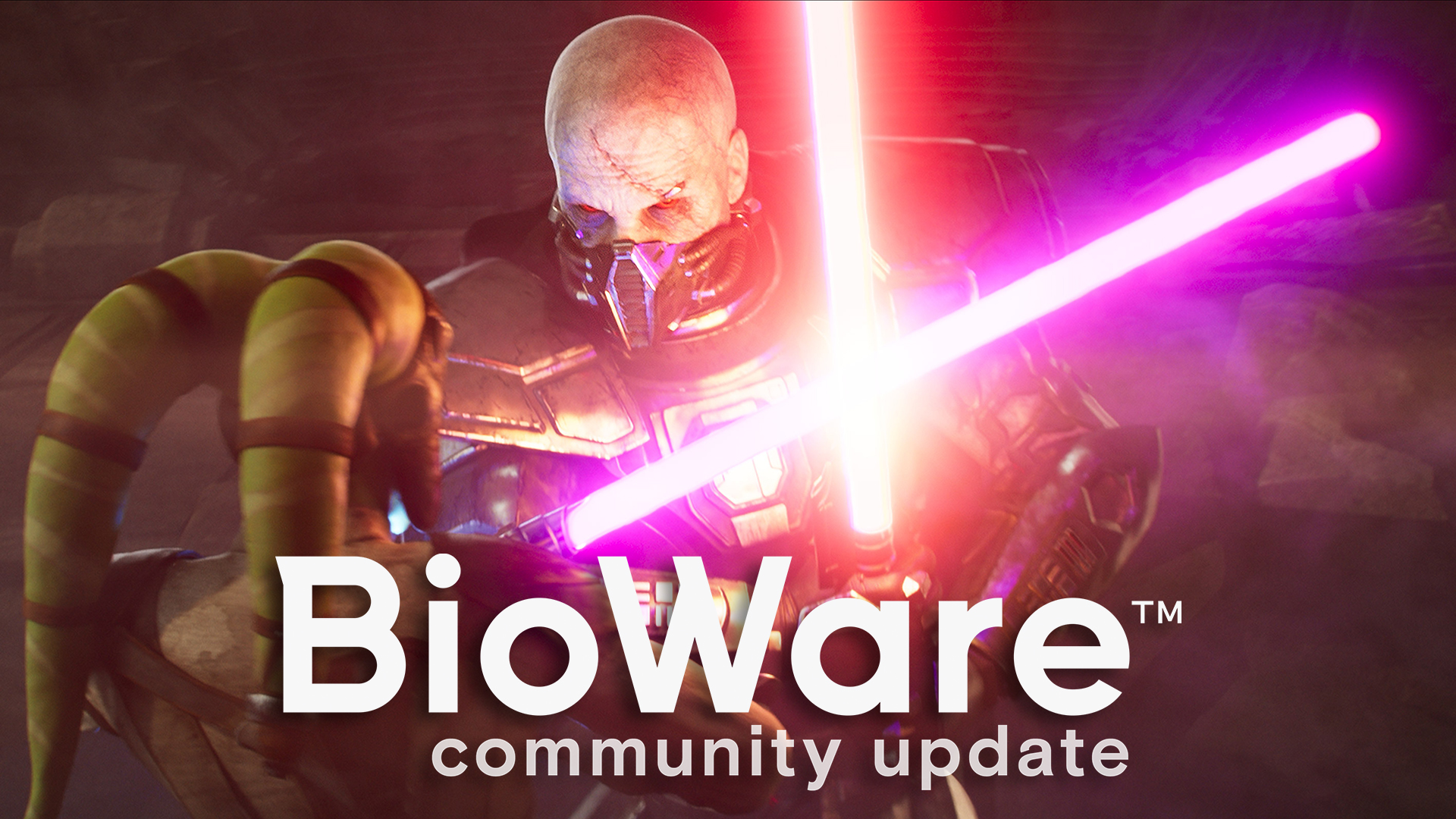Bioware, a name that resonates deeply within the gaming community, has become synonymous with storytelling and immersive gameplay experiences. Since its inception, Bioware has consistently pushed the boundaries of what video games can achieve, captivating players with rich narratives and unforgettable characters. If you're a gamer, you've likely encountered their groundbreaking titles like Mass Effect, Dragon Age, and Star Wars: Knights of the Old Republic. But what makes Bioware so special? Let's dive into the world of this legendary studio and uncover what sets them apart from the rest.
For many gamers, Bioware represents more than just a studio; it's a symbol of excellence in game development. Their ability to craft intricate storylines, combined with deep character development, has earned them a loyal fanbase worldwide. But it's not just about the games—it's about the emotional connection players feel when they embark on these epic adventures. Whether you're saving the galaxy as Commander Shepard or navigating the dark politics of Thedas, Bioware ensures that every moment counts.
So, why are we here talking about Bioware today? Because understanding their journey, their successes, and even their challenges can give us insight into the future of gaming itself. As technology evolves and player expectations grow, studios like Bioware are at the forefront of innovation. Stick around, and we'll break down everything you need to know about this iconic developer, from their humble beginnings to their latest projects.
Read also:Hdb4u Hub The Ultimate Guide To Your Housing Dreams
Table of Contents
- A Brief History of Bioware
- The Founding of Bioware
- Early Games and Breakthroughs
- Mass Effect: The Game-Changer
- Dragon Age: A New Fantasy World
- Star Wars: Knights of the Old Republic
- Challenges Faced by Bioware
- The Future of Bioware
- Bioware's Impact on the Gaming Industry
- Conclusion: Why Bioware Matters
A Brief History of Bioware
Bioware's journey is one of passion, perseverance, and innovation. Founded in 1995 by Dr. Ray Muzyka and Dr. Greg Zeschuk, two Canadian doctors with a shared love for gaming, the studio quickly made a name for itself in the RPG genre. Their early games, like Shattered Steel and Baldur's Gate, set the stage for what was to come. What started as a small indie studio grew into a global powerhouse, influencing countless developers along the way.
But it wasn't always smooth sailing. The road to success was paved with challenges, from tight deadlines to creative differences. Yet, through it all, Bioware maintained its commitment to quality and storytelling, earning the trust and admiration of millions of fans worldwide. Today, they stand as one of the most respected names in the gaming industry, with a legacy that continues to inspire.
The Founding of Bioware
Back in the mid-90s, when gaming was still finding its footing, two doctors in Edmonton, Canada, decided to follow their dreams. Ray Muzyka and Greg Zeschuk, both practicing physicians, shared a passion for gaming and believed they could create something special. With the help of Augustine Yip, they founded Bioware, a name that would soon become legendary.
Initially, the team worked out of a small office, juggling their medical careers with their newfound passion for game development. It wasn't easy, but their dedication paid off. Their first game, Shattered Steel, was a modest success, showcasing their ability to create engaging gameplay experiences. From there, they began to build a reputation for quality and innovation, setting the stage for their future triumphs.
Early Games and Breakthroughs
Bioware's early games laid the foundation for their future success. Titles like Baldur's Gate and Neverwinter Nights not only pushed the boundaries of RPG gaming but also introduced players to complex narratives and deep character customization. These games were more than just entertainment; they were experiences that stayed with players long after the credits rolled.
Baldur's Gate, in particular, was a game-changer. It brought Dungeons & Dragons to life, allowing players to explore a vast, open world filled with danger and adventure. The game's success paved the way for future projects, proving that Bioware had what it took to compete with the best in the industry. And let's not forget Neverwinter Nights, which introduced innovative features like a built-in game editor, allowing players to create their own adventures.
Read also:Ellie Nova Movie The Ultimate Guide To Her Cinematic Journey
Mass Effect: The Game-Changer
When Bioware released Mass Effect in 2007, they didn't just create a game—they created a phenomenon. Set in a vast, sci-fi universe, Mass Effect combined action-packed gameplay with deep storytelling, offering players the chance to shape the fate of the galaxy. The game's protagonist, Commander Shepard, became an instant icon, with players forming deep emotional connections to the character and their choices.
What made Mass Effect truly special was its emphasis on player agency. Every decision mattered, from the alliances you formed to the battles you fought. The game's sequel, Mass Effect 2, built on this foundation, introducing new characters and expanding the universe. By the time Mass Effect 3 rolled around, the series had become a cultural phenomenon, with fans eagerly awaiting each new installment.
Dragon Age: A New Fantasy World
While Mass Effect was taking the sci-fi world by storm, Bioware was also exploring new frontiers with Dragon Age. This dark, gritty fantasy series offered players a fresh take on the RPG genre, with rich storytelling and morally complex characters. Dragon Age: Origins, the first game in the series, was a critical and commercial success, earning praise for its deep narrative and engaging gameplay.
Dragon Age: Inquisition, the third installment, took the series to new heights, offering players an expansive world to explore and a host of memorable characters to interact with. The game's success helped solidify Bioware's reputation as masters of storytelling, proving that they could excel in multiple genres. With Dragon Age: Dreadwolf on the horizon, fans are eagerly anticipating what the studio has in store next.
Star Wars: Knights of the Old Republic
No discussion of Bioware would be complete without mentioning Star Wars: Knights of the Old Republic (KOTOR). Released in 2003, this game was a love letter to Star Wars fans everywhere, offering a rich, immersive experience set thousands of years before the events of the original trilogy. KOTOR's success helped cement Bioware's place in the gaming world, earning critical acclaim and a dedicated fanbase.
What made KOTOR stand out was its emphasis on character development and moral choices. Players could choose to follow the light side or the dark side of the Force, with their decisions impacting the story and the world around them. The game's legacy lives on, with many fans considering it one of the greatest RPGs of all time.
Challenges Faced by Bioware
No journey is without its challenges, and Bioware has faced their fair share. From controversial game endings to production delays, the studio has had to navigate a complex landscape of player expectations and industry pressures. One of the most notable controversies came with the release of Mass Effect 3, whose ending left many fans feeling unsatisfied.
Despite these challenges, Bioware has remained committed to listening to their fans and improving their games. They've learned from their mistakes, using feedback to refine their processes and deliver better experiences. This commitment to quality and player satisfaction has helped them maintain their reputation as a leader in the gaming industry.
The Future of Bioware
Looking ahead, Bioware has some exciting projects on the horizon. Fans are eagerly awaiting the release of Dragon Age: Dreadwolf, which promises to deliver a fresh take on the beloved series. Meanwhile, rumors of a new Mass Effect game have fans buzzing with anticipation, hoping for a return to the galaxy they love.
As technology continues to evolve, Bioware is well-positioned to take advantage of new opportunities. With advancements in graphics, AI, and storytelling, the studio is poised to push the boundaries of what games can achieve. Whether it's exploring new worlds or revisiting old favorites, Bioware is sure to deliver experiences that captivate and inspire.
Bioware's Impact on the Gaming Industry
Bioware's influence extends far beyond their own games. They've set a standard for quality and storytelling that countless developers strive to emulate. Their emphasis on player agency and moral complexity has changed the way we think about video games, making them more than just entertainment but experiences that challenge and inspire.
Through their work, Bioware has shown that games can be more than just a pastime—they can be art. Their dedication to crafting meaningful stories and engaging gameplay experiences has left an indelible mark on the gaming industry, inspiring a new generation of developers and players alike.
Conclusion: Why Bioware Matters
Bioware matters because they've redefined what video games can be. From their humble beginnings as a small indie studio to their current status as a global powerhouse, they've consistently pushed the boundaries of storytelling and gameplay. Their ability to create immersive, emotionally resonant experiences has earned them a loyal fanbase and a reputation as one of the best developers in the industry.
So, whether you're a long-time fan or a newcomer to the world of Bioware, there's something for everyone in their games. So why not dive in and experience the magic for yourself? And don't forget to share your thoughts in the comments below or check out our other articles for more gaming insights. Thanks for reading, and happy gaming!


